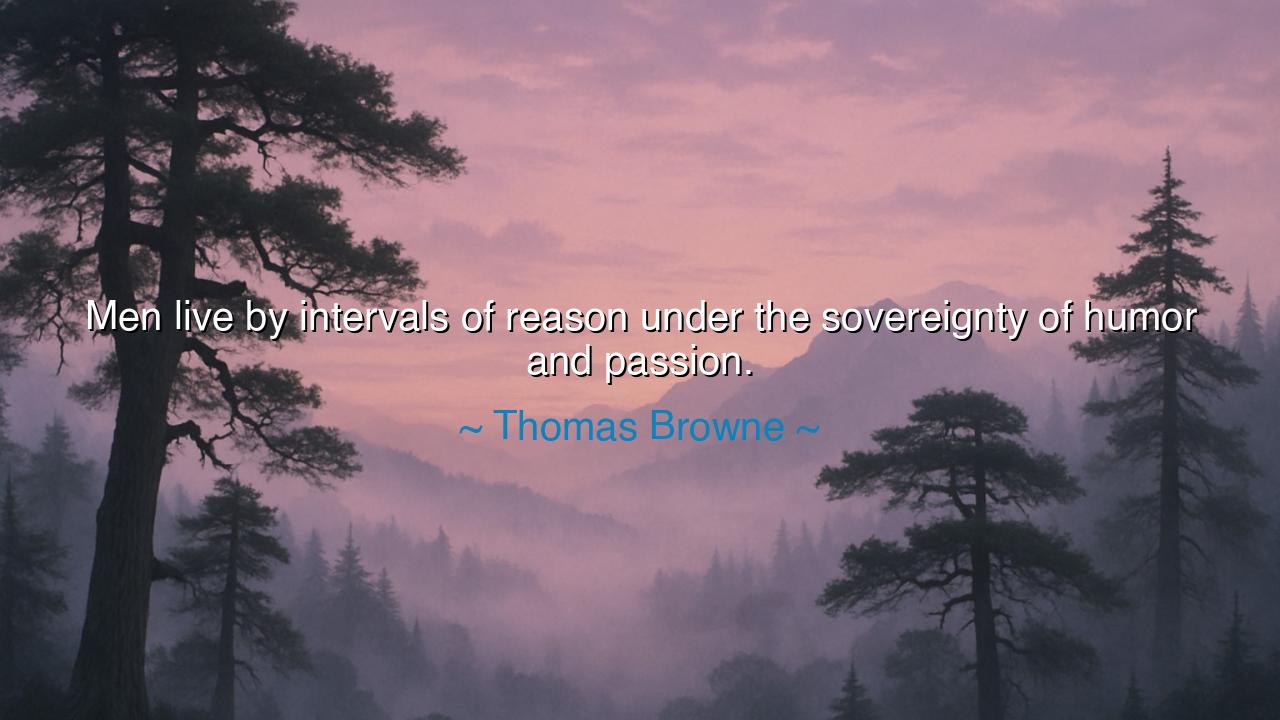
Men live by intervals of reason under the sovereignty of humor






In the immortal words of Thomas Browne, “Men live by intervals of reason under the sovereignty of humor and passion.” Thus speaks the voice of an age that understood the contradictions of the human soul — that we are not creatures of logic alone, but beings bound to both reason and emotion, intellect and impulse, wisdom and wonder. Browne, a physician and philosopher of the seventeenth century, saw clearly what many still struggle to grasp: that reason is but a flickering lamp within us, and it burns brightest only in moments — intervals — before it is again dimmed by the sovereign forces of humor and passion that rule the heart of mankind.
For what is man, if not a vessel divided between the mind and the spirit? The ancients called this duality the war between Apollo and Dionysus — the god of order and clarity contending with the god of ecstasy and chaos. Browne’s words echo that eternal struggle. In our calmest hours, when reason governs, we speak wisely, plan prudently, and judge fairly. But these moments are fleeting. For soon enough, the tide of emotion rises — laughter bursts forth, anger consumes, love overwhelms — and the sovereignty of humor and passion reclaims its throne. Thus, we live not as perfect creatures of intellect, but as wandering souls, swayed between clarity and chaos, light and flame.
Consider the tale of Alexander the Great, whose mind was trained by Aristotle himself — reason’s greatest disciple — yet whose heart was often ruled by passion. He conquered nations through strategy and discipline, but in a single fit of rage slew his friend Clitus, who had once saved his life. When the storm passed, remorse fell upon him like a mountain. In that moment, the philosopher within him wept for the warrior he could not control. Browne’s truth lived within Alexander: he ruled empires with reason, but was ruled himself by the sovereignty of passion.
And yet, Browne does not condemn this condition — he describes it as the essence of humanity. To be human is not to be purely rational; it is to feel deeply and think deeply, to be carried by the winds of emotion yet guided by the compass of reason. Even humor, that lightness of the soul, holds dominion over us. For laughter often dissolves pride, heals pain, and reveals wisdom where solemnity cannot reach. The fool may speak truth when the sage is silent; the jester may heal the king’s heart more swiftly than the priest’s sermon. Thus, humor, too, is a kind of divine sovereignty — a reminder that not all wisdom wears the robe of solemnity.
In our own lives, how often do we see this play of forces? We make resolutions in the stillness of morning — to be patient, disciplined, kind — but as the day unfolds, desire and temper break through our vows. We are pulled toward love, anger, joy, and sorrow as the moon pulls the sea. Yet it is not weakness that defines this, but balance — the art of living between the intervals of reason and the sovereignty of passion. The wise do not seek to extinguish emotion, for that would be to kill the very fire of life. Instead, they learn to let reason steer the flame rather than be consumed by it.
The ancients taught that moderation — the middle path — is the key to harmony. In the Stoic temples, they whispered: “Let reason be the charioteer, and passion the horses.” Without reason, the chariot careens into madness; without passion, it cannot move at all. Browne’s insight mirrors this ancient teaching. We are not meant to deny humor and passion, but to understand that they are sovereigns, and that reason, though intermittent, is the counselor that keeps their kingdom from chaos.
So, my children of thought and feeling, take this lesson with you: Honor both the mind and the heart. Do not curse your passions, nor worship them. Let your humor remind you to be humble; let your reason remind you to be just. When anger comes, pause — when laughter rises, savor it — when love burns, let it guide but not blind you. For the beauty of humanity lies not in the triumph of reason over passion, but in their dance together, each taking its turn in the rhythm of life. In these intervals, we find not perfection, but truth — the truth that to live fully is to think wisely, feel deeply, and laugh freely beneath the sovereign sky of our own divine contradictions.






AAdministratorAdministrator
Welcome, honored guests. Please leave a comment, we will respond soon